We take a lot for granted operating in the 21st century. Between sophisticated cars that self-diagnose issues to automated reservations and dispatch systems that streamline some of the most difficult processes to the ability to do business globally in a split second, it’s hard to remember a time when commerce was driven by pen and paper, even, in some cases, before motor-driven vehicles were mainstream modes of transportation.
It’s a rare company that has withstood the economic ebbs and flows that have been the realities of the previous century—the Great Depression, the birth of the modern highway system, industrial revolution and decline, the swift rise of technology, numerous recessions, and two World Wars, to name a few. Chauffeured ground transportation has changed rapidly in just the past two decades, but transportation in general has changed exponentially over the past century. Still, the core of what operators do—chauffeuring a customer from one place to another in style—has not. We take a walk down memory lane with six companies that have adapted over a century.
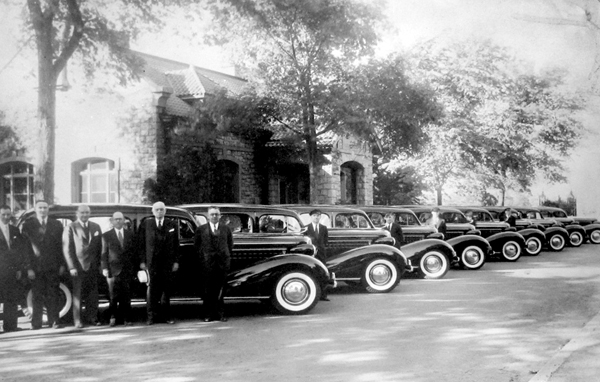 BBZ Limousine & Livery Service BBZ Limousine & Livery Service
BBZ Limousine & Livery Service BBZ Limousine & Livery Service
The oldest of our featured companies, BBZ Limousine & Livery Service was founded in 1869 as Berkemeyer Livery in New Milford, N.J., by veterinarian Dr. Irving Berkemeyer. After his son joined the firm, the company began adding cars to its business in the early 1900s. Throughout the 20th century, the company thrived as a well-respected funeral car service, while also breeding notable racehorses. In 1970, the company, then called Berkemeyer Limousine, was sold to longtime employee Nicholas Malloy. The company remained prosperous throughout the decades and has successfully transitioned into a full-service luxury ground transportation provider. The firm eventually acquired several local competitors, most notably Bergen Limousine and Zabriskie & Stott Livery, from which its current name is derived.
Chauffeur Driven spoke to three representatives of BBZ, current President Nick Manoy Jr.; Vice President of Finance, Arthur Dolson, who has more than 40 years with the company; and Vice President Jason Messinger.
What are some key moments in your company’s history?
AD: The first car was introduced into the business in 1914, and the last horse died in 1988. Irv Berkemeyer was an avid racehorse enthusiast—he founded Cardigan Stables—and owned several world-famous horses that earned a considerable amount of money and trophies.
We also acquired a few companies over the years. The whole demographic of funeral service has changed dramatically in the past 25 years so that part of the service isn’t as extensive as it once was. VP Jason Messinger was great at finding us other avenues of untapped revenue. We had to transition into doing more private work: airport transfers, executive travel, and nights on the town.
How did leadership transition to meet changes?
NM: My father purchased the company in 1970, and in 1976, I came on full time. We were primarily a funeral livery, and it was a very lucrative business. We also did about 500 weddings a year. That was back in the day when a limousine was a standard Cadillac four-door with a jump seat.
In the ’90s, we began to get more involved in the airport business and private limousine service, but also acquired other funeral livery companies. In 1995, we purchased Zabriskie & Stott, which also did a lot of private work—our first real move into the private business. That was probably the biggest change for our company because that’s when we were getting into something we weren’t used to doing.
How have the expectations of luxury changed over time?
NM: In the ’70s, we had strictly Cadillac limousines, which was “the” car. There was no competition: At a wedding in those days, if people had a black car, they were thrilled. And then in the early ’80s, when builders started really stretching vehicles, the industry dramatically changed. There were very few limousine companies back in the ’70s. But then, each year I would look in the phone book and see 20 new companies.
How has technology impacted your business?
JM: Technology has changed us tremendously. Back in the day, everything was on paper, and put into books and folders. Now, with smartphones, chauffeurs are able to communicate with the office and update their status. Automated email and GPS tracking have been big advantages. I come from a tech background, so I’ve tried to leverage it as best as I can.
How did your company pivot to survive and again thrive during and after major economic crises?
AD: We’ve had our peaks and valleys, for sure, and like any other business, when you have those lean times, it’s good to have money saved for that rainy day. We’ve always been self-financed and self-sufficient. Of course, when you go back to the ’20s and ’30s, people around here didn’t even own cars. I think we charged $4 a day for a car back then.
How do you honor the founding tenets of the company?
AD: We have memorabilia and photographs in the building. To have evolved continually since 1869 is a recognition of the company’s stability and the dedication our people have to running it.
When did you adopt an affiliate model?
JM: It was about five years ago, when I came on. I saw a lot of opportunity in the corporate private transportation sector. That’s when I started going to limo shows and making relationships with affiliates, and it’s been very successful. My goal was really to expand our retail and corporate work.
How do you think driverless cars will impact the industry?
JM: If you don’t evolve, you become irrelevant and fade away. Perhaps we’ll have autonomous cars, but instead of a chauffeur driving you, he is someone to help and serve you in the car. I’m not sure where’s it’s going to go. With today’s technology, passengers are on their phones getting more involved in how a chauffeur gets to their destination. If you have an autonomous vehicle, it takes that aspect away. While some people like to sit back and enjoy the ride, we have so many people who plan their route before they even get in the car.
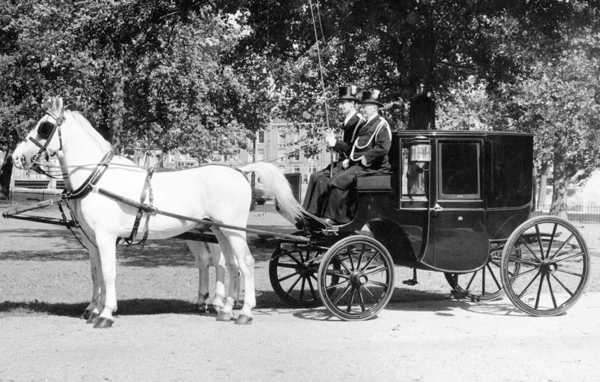 Van Delden Corporate Limo Services Van Delden Corporate Limo Services
Van Delden Corporate Limo Services Van Delden Corporate Limo Services
When Van Delden Corporate Limo Services was founded by Herman van Delden in 1888, the company provided service via a single horse and carriage. Amazingly, it wasn’t until 1959 that the Amsterdam-based company introduced first cars—Cadillacs, no less—into its fleet. Remaining active through some of Europe’s darkest periods, Van Delden remains a family-owned company, now in its sixth generation.
Company Director Ralph van Delden spoke to Chauffeur Driven about his family’s rich history.
What are some of the key moments for the company?
The company was founded officially in 1888 and had about 26 horses. In 1927, it had grown to 120 horses and 80 carriages; after WWII, we had 16 horses left because we had to sell them.
The founder died in 1906, and his oldest son took over. He didn’t like the business, so Herman’s wife took over before passing it on to her youngest son, Herod, my great-grandfather. In 1943, my grandfather, who was just 16, started helping in the business because the schools were closed due to the war.
In 1959, the first cars arrived—Cadillacs. Many followed. Later on, the horse and carriage work continued until the ’80s. We were the first private company that ever transported a member of the royal family, Princess Beatrix, and we still have a picture of my grandfather driving the carriage with the queen inside.
In the ’70s and ’80s, we started working with luxury tourists and airlines, which was around the time that my father joined the business. He started driving when he was 18 in 1973; he worked together with my grandfather until the ’90s and took over completely in 1997. I started driving during college in 2002, but didn’t officially join until 2005; I took over in 2013.
What’s the secret to your company’s longevity?
People who work here have always been family members: It is part of their life, part of their history, and you’re always proud to continue something your family founded. If we screw it up, it’s our name on the line. But you never do it alone: Our employees are considered family. We always believe in service with a personal touch, staying true to ourselves, and following our ground values. Do your best, and nothing but your best.
How do you honor the founding tenets of the company?
My grandfather had a quite big name in Amsterdam; he was rewarded with prizes by Prince Bernhard, the husband of our queen at the time. He always worked day and night for the people. “A man, a man; a word, a word,” he always said. If you give your word, you have to keep your promises and do what you say. It’s about being loyal and being reliable.
When did you adopt an affiliate model?
It actually started with my father in the early 2000s and the internet, which makes the world smaller. Because we’ve been so involved with the country and the city, Amsterdam started to promote Holland and lots of requests for transportation came. We were also being promoted by the Dutch embassy, because we were known by embassies in other countries and had such good references.
How has technology affected the business?
We’re always looking for ways to make things easier. I remember when we still primarily used a fax machine for our hundreds of pages of reservations, which we would write down in accounting books. It was all hand-written until halfway through the ’90s when everything was done on computers. We started taking online reservations in 2003.
We had phonographs in our first cars, but they skipped a lot so it wasn’t ideal. We also had a telex before the fax, and my father and grandfather would argue about buying a fax machine, as my grandfather thought they were too expensive. Then my father said that we need to have computers, which my grandfather considered expensive typewriters. My father was a strong believer in keeping up with technology; he always had a vision of working with new things.
Back when we had beepers, chauffeurs would always carry quarters so they could call back on a pay phone when paged.
Looking ahead, what do you think will happen with driverless vehicles?
I don’t believe our success comes from the cars—it comes from the chauffeurs and the people, and the chauffeur can use his own experience to show a passenger something not on the main route or a favorite spot of his, he can adapt, he can hold the umbrella and assist with their luggage. Of course, robots are coming, so it’s not if but when. Regular taxi service just gets you to Point B from Point A—it’s why Uber is so big—but that’s not what we do. We provide a service around it. We have to keep our eyes open and adapt at the right moments.
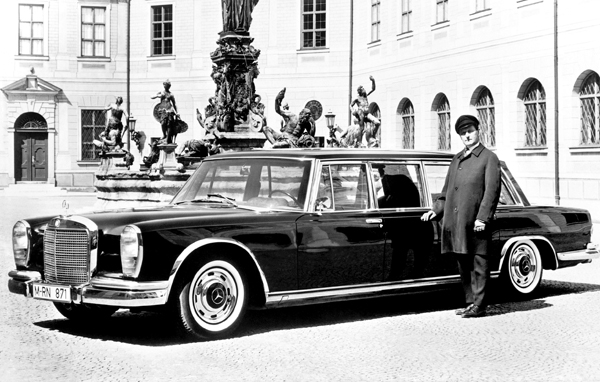 Sixt Sixt
Sixt Sixt
Sixt is one of the world’s most recognized names in car services, whether it’s Sixt Rent a Car, Sixt Limousine Service, or one of its other subsidiary companies. Established in Munich in 1912 with three vehicles, Sixt offered rental cars as well as chauffeur services from the start. Still operated by the Sixt family (now in its fourth generation with CEO Erich Sixt at the helm with his wife Regine Sixt), the company is a multi-billion dollar firm operating under the tenet of “the customer is the boss.” We spoke to Michael Schneider, managing director of Sixt Limousine Service.
Are you still in the same city as your founding?
Sixt had its very first branch in downtown Munich. Before the Sixt Group headquarters moved to Pullach in the south of Munich into its own building. Sixt Limousine Service has its headquarters there with presences worldwide.
What’s the secret to your company’s longevity?
Sixt was about creating excitement from the beginning. The company always questions its own services and develops them to offer a better car rental experience to customers and are constantly finding ways to be innovative. Our philosophy is every service and every product has to serve the customer’s needs and wishes. That’s not an empty phrase; it’s the reason why we—regarding the Sixt Limousine Service—offer a wide range of services from airport transfers to sightseeing tours or even diplomatic mandates.
What are some key dates in your company’s history?
1912 is an important date for us because it was the beginning of Sixt! Since then, many milestones marked our way to success—it would be hard to mention all of them. CEO Erich Sixt joined the company in 1969 and pushed the rental car business strongly and opened a new department, Sixt Leasing. In 1989, we started our international expansion in other European countries and later into the U.S. and the world.
How has luxury been redefined over the years?
More than 25 years ago our chauffeurs wore white gloves and hats as part of their uniform, but not today. Also the image of a chauffeur driven car has changed over the years.
Do you assess risk differently because of the age of your company?
Yes, we act differently. Sixt has always been keen not to take uncalculated risks. We believe in thinking innovatively, but always acting with foresight.
How do you honor your founders?
The most important tenet is a quote from Erich Sixt: The customer is the boss. When you have this in mind, you have to improve your business permanently. You have to change in the same way your customers are changing. Innovation—thinking of the car’s technology and also of digitization—is an obligation. We’re in the fourth generation of the Sixt family, and each one has used technical developments for their business.
How has the evolution of technology impacted the company?
Sixt always had been ahead of the time given technical innovations. For example, in the late ’60s Sixt was the first chauffeured company in Germany to equip cars with radio transmitting sets in order to react faster to customer reservations. Later Sixt became one of the first to have an online booking platform; today, Sixt is working on the “keyless” car rental. We have an advisory board with our important clients which regularly helps us to listen carefully to the customer’s exact needs.
When did you adopt an affiliate model?
Our aim is to grow together with our own corporate network (Germany, Austria, Switzerland, and France) as well as develop our franchisees to become fully a part of the Sixt network also in terms of chauffeured services. A franchisee needs to comply with all our service standards. It is a much stronger relationship than a third-party affiliate.
What do you think will happen with driverless vehicles?
It’s the chauffeur who drives the car today but he’s doing much more than driving. Our clients prefer to receive a first-class treatment, so maybe we have a concierge or personal assistant in the car assisting our valuable passengers. There is no fear of any future development; we are confident to face new challenges in the market. A bigger issue is the governmental regulations worldwide, which lead to unequal competition between those who follow the rules and those who do not.
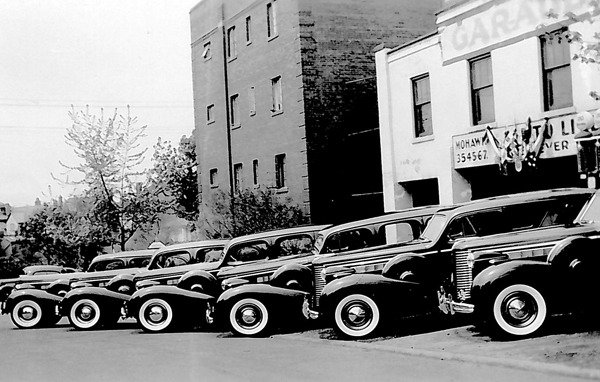 Cullitons Limousine Service Cullitons Limousine Service
Cullitons Limousine Service Cullitons Limousine Service
Frederick Culliton founded Cullitons Limousine in 1918 as an offshoot of his family’s long-established cemetery curation business in Toronto. Culliton purchased his first car in 1918, and his company quickly made a name for itself as one of Canada’s leading limousine services by treating every customer as a dignitary. In fact, when England’s King George VI and Queen Elizabeth visited Toronto in 1939, Cullitons Limousine was chosen by the royal family to provide their transportation.
Through the years, the company changed hands a number of times before being purchased by the Dahdaly family in 1981. Today, Cullitons Limousine Service is one of North America’s most respected firms, servicing corporate clientele around the world. CD spoke to current President John Dahdaly about the company’s history and future.
Do you feel that there is a secret to your company’s longevity?
Perseverance and our ability to adapt to the changing nature of our industry is what kept us in business. Our number-one objective is to provide safe, reliable ground transportation at competitive prices. Our aim is not only to meet our customers’ expectations but to exceed them in every way possible.
Is there a key moment that changed the course of the company?
I believe that the key moment is actually when my family took over the company and nursed it back to health and vibrancy. In order to achieve the growth we wanted, we acquired two smaller companies in the late ’80s, and both were fully amalgamated under the umbrella of Cullitons Limousine Service.
How has luxury changed over the years?
There were the times where you needed to have a bar and TV in the stretch. Our customers are not interested in that now. They’re interested in the maintenance of the vehicle, being comfortable, and the attitude of the chauffeur. A good vehicle with comfort and room—minibuses or SUVs—that’s what’s considered luxury these days.
Do you assess risk differently because of the age of the company?
There is no advancement without risk. The difference between an established company and a newer one is the older your company, the more history you have, and the more experience and challenges you have to overcome. This also allows you to learn from past mistakes. These are the things that a new start-up company does not have.
How has the evolution of technology affected the direction of the business?
We strongly believe in technology, especially if you want to advance and position yourself as a leader in the industry. We were one of the first companies to use alphanumeric pagers, which ensured accuracy and speed in transmission at the time. Now the options in technology are unlimited and evolving. Technology hasn’t changed the direction or vision of our company, but it has made it easier for us to respond to our clients’ requests and needs in a much faster manner and, above all, with more accuracy.
How did your company navigate the numerous economic downturns?
In hard times, the first thing scaled back by any company is travel since it’s an easy way for any organization to see immediate savings. Therefore, ground transportation is one of the first industries to feel the pinch.
One of our biggest advantages we had during the recession was being able to keep all our staff on board. When things picked up, we didn’t need to hire and train anyone.
Being able to ride the waves of the economy is the hardest challenge of all. Every company has its own philosophy on what is best, but we met our challenges by conforming to the needs of our clients and giving them more options. In 1981, Cullitons only operated stretch limousines, but today we offer a variety of vehicles choices.
When did you adopt an affiliate model?
Affiliate work started in early ’90s. Our first affiliate was Carey.
How do you think driverless vehicles will impact the industry?
The word “service” is part of our company’s name; therefore, while driverless vehicles will be able to provide clients with a transfer from Point A to Point B, they will not be able to provide a service that a chauffeur is able to do, from the simple greeting, to carrying your bags, to opening the doors or assisting a passenger in and out of a vehicle.
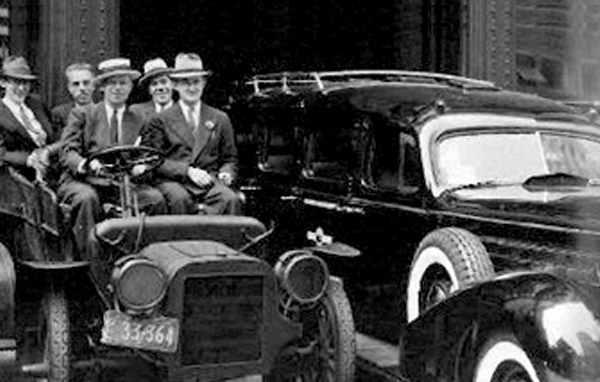 Carey International Carey International
Carey International Carey International
It’s a great American entrepreneurial story: Irish immigrant JP Carey was a barber in Grand Central Station in New York City in the 1920s. He noticed folks coming in droves from various locations outside of Manhattan and headed downtown, where most commerce was at the time. He saw that there really wasn’t a consistent way to get downtown efficiently until Carey. First it was jitneys, then limousines—the “Carey car.”
The company was based in—and limited to—New York until visionaries Vince Wolfington and Don Dailey helped to push the company to its next level, at one point taking the company public in 1997 ... and private again in 2000. Carey is now based in Washington, D.C., and is the only franchise-model company in the industry. We spoke with President and CEO Gary Kessler, who joined the company in 1999.
What are some key moments in the company’s history?
Carey became the most widely recognized limousine company in New York and it remained that way until the 1970s. In the late ’70s, Vince Wolfington, a merchant banker, and Don Dailey, a travel professional who had once worked for United Airlines and later founded a transportation company in San Francisco, got together and saw a market need. There was no single place for a traveler to book and use limousine service in the cities to which they would be traveling, a one-stop shop. They put their collective business experience and creativity together. Mr. Wolfington suggested to the Carey family that he license the company name outside of New York, and from there they built the first limousine network in the industry with a centralized reservation system. They went about franchising the name Carey throughout the U.S. and then internationally. The Carey family is no longer involved.
Of course, September 11 later taught us that we needed to become more nimble in order to sustain the company during the ups and downs. There was a lot of inward focus on how to build the most scalable and successful organization we could. We have really embraced change and look at it as an opportunity to create innovative solutions to thrive in any economy.
Do you have any interesting stories about the founders?
I once asked Mr. Wolfington why he wanted to move the company headquarters out of N.Y. because I felt that it was the epicenter of public transportation. He said that they wanted to build a global company, and if they had remained there they never would have looked beyond Manhattan. So even then, right down to the corporate location of the headquarters, they had a vision for what it would take to build an international company.
This is a story that comes from the lore of Carey: Mr. Carey was frustrated by how the heat would impact his traveling dignitaries during the summertime months in N.Y. Being the great innovative gentleman that he was, he was known to put giant blocks of ice in the rear of the vehicle with fans to blow the cool air onto the passengers in the back seat. Now, I can’t say for certain that he created the first in-car air conditioning systems, but I can say that we were founded by a very creative man who left nothing to chance for his clients.
What do think are the secrets to your longevity?
The foundation of the company was built by smart, entrepreneurial people, and it’s continued to be our hallmark. Our founders were always looking at ways to be innovative and embrace change. We’re fortunate: We had a visionary founder and leader in 1921, and in the 1970s, we had a rebirth that built an international company. We’re an initiative-driven company.
How has technology impacted the company?
Carey companies are all integrated under a proprietary centralized management system, one that we started building in the early 2000s. We knew that scalability would only come from information that is centralized and distributed, and it helped us to react and adapt very quickly to the economic swings over the last two decades.
In 2009, we launched Embarque, a more streamlined mode of transportation built on the same driving principles of Carey but a more economical service offering. It wasn’t without risk: We had to be very frank with ourselves about what the real risk of not acting was.
How do you think driverless vehicles will impact the industry?
I see it as an opportunity. There will always be clients who want the personal touch and peace of mind that comes with having a professional serve them through their travels, whether it’s navigating them through a place they’ve never been or keeping them on schedule. I think that it won’t be technology that holds up the proliferation of those cars, but the challenges of infrastructure—one that is woefully behind the times. But like I said, Carey has always been a company that embraces change, and there will be customers who will want to go to a company that maintains those driverless cars to the top level that they can be maintained, so we’ll probably have that type of service, too.
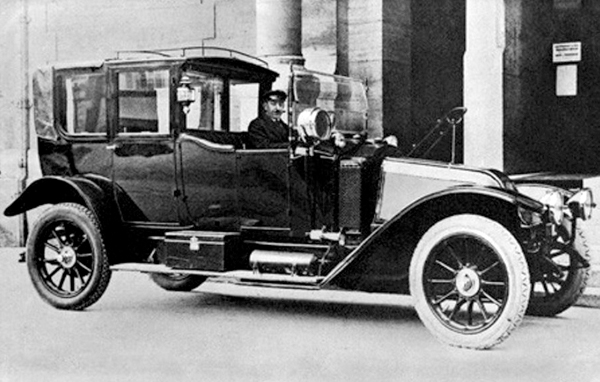 Chabé Chabé
Chabé Chabé
Chabé was founded in the cosmopolitan city of Paris in 1921 by Maurice Chabé to handle transportation for ultra-high-net-worth individuals to and from their hotels. That relationship with the hospitality industry supported the business for decades.
Today, the company operates 300 cars in several European locations and is still family owned with some private equity investors. It opened a second location in 1990 in Cannes, and has since opened seven additional offices. The generations of leadership include two women: Elaine Lo Jacomo and Agnes Lo Jacomo, the founder's daughter and granddaughter, respectively. We spoke with Managing Director Guilluame Connan, who currently runs the company with his mother and Company Chairman, Agnes.
What is your secret to longevity?
It’s a tough business, everybody knows that, but you need a passion for it, which I believe the generations of my family have had. I feel like it’s a part of our DNA. We focus on complicated and demanding clients. You have to love what you do and we were lucky enough through the generations to have that passion. Also, you need to have flexibility and equity in reserves to survive over time.
What are some key dates in your company’s history?
In 1929, my great grandfather, Maurice Chabé, was one of the founding members of Les Cléfs d’Or, a world renowned hotel concierge organization. That helped us to nurture relationships with hotels, which now account for about one-third of our revenues.
During WWII, my great grandfather hid his cars in Paris to keep them safe. After the war ended, the government was desperately looking for prestigious cars, but since there were so few in supply, he was able to get clients quickly. He died in the 1950s and my grandmother took over the company at age 30. It was complicated to be a lady at the head of a business in the ’50s, but she was tough and successful. In the ’90s, my mother took over the company. She had great skills that helped the company move into the next century to develop and grow, going from €3 million to €30 million in just 20 years.
How has technology affected the company?
My mother worked at IBM, so even in the late 1980s she had a sense for the changing technology and invested in it. But it’s not just about technology, but about getting clients because of that innovation. It has forced us to think globally and understand what the customer can and can’t do on their own. We’ve invested €1 million in technology and have a team of seven, it’s massive.
How was your company impacted during those times of global recessions?
Because we are dealing with high-end clients, it didn’t impact us as much. If you serve this demographic, they will always travel. However, we’ve had to diversify. If we were only focused on hotels like we were 20 years ago, we would have had a significant impact because the recent terrorist attacks impacted tourism. Now we do a lot more events and dedicated transportation for C-level executives. We’re a multi-specialists.
When did you adopt an affiliate model?
Very early on we were focused on the hotel industry but have since diversified. We do less than five percent of our business internationally and it’s miserable compared to what I feel it should be. We did not do a good job farming out because we were so focused on the local market. We just started growing the affiliate network this year.
How has luxury changed over time?
We have always handled transportation for very wealthy individuals so our attention to detail has to be second to none. When the Four Seasons opened in Paris, there were some issues with missing clients at the airport becuase of the special rules. So, 20 years ago we started what we now call the VIP Meet and Greet, where you have a representative at the exit of the plane who takes the client through customs and delivers them to the chauffeur. As volume has grown over time, we used it as a way to expand our company so now we have 15 hostesses who greet customers all day at the airport.
Now we’re all talking about Uber but next will be the autonomous vehicles. Let’s say we have them in 5 to 10 years, and they will be free. If you are in this worst-case scenario, how will I make sure that my clients still want to pay for a chauffeured vehicle with me? There are answers: You just need the right positioning and value for the clients.
How do you honor the founding values of the company?
It’s tradition in our family that you cannot take a position within the company until you have proven that you can do something else. You have to create your own path in other industries first and show you are capable; it’s not a given. And you have to prove every day that you are “worthy.” My grandmother is 93 years old and still has an office at the company. She still comes to the office every week. The fact that she is still linked to the company is very important. [CD1216]
Centenarians: Six Companies That Have Spanned a Century
- Details

